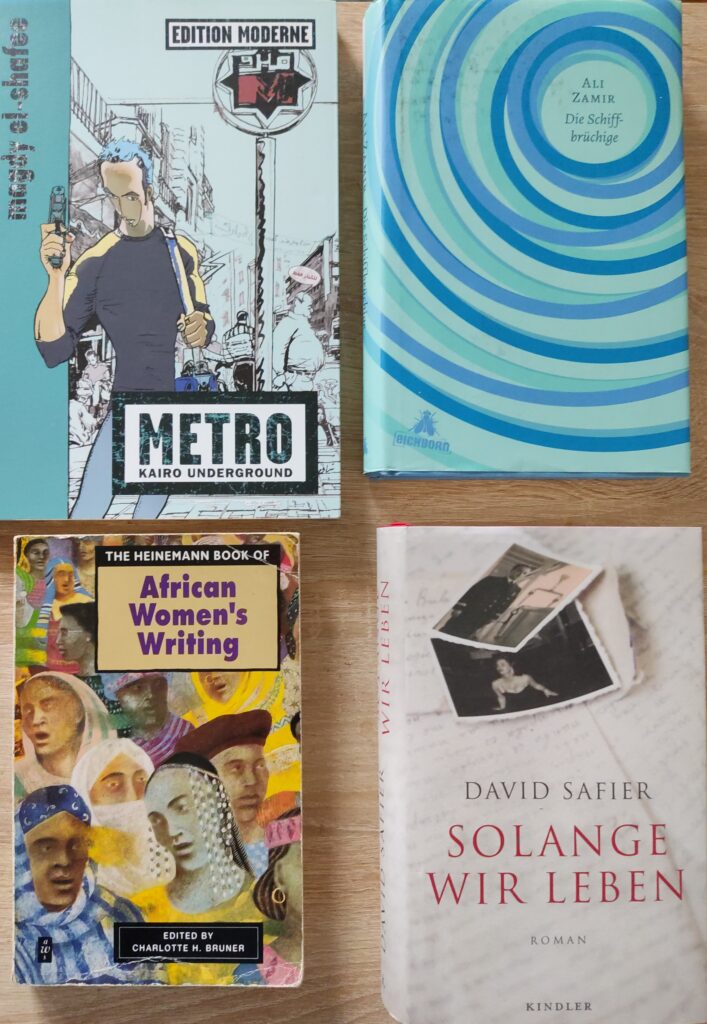Eleven books finished this month, six in German and eight by women/POC — all of those as part of my theme for the month of African writers. I really enjoyed this one, especially because I managed to get books from a good range of countries.

- The Ultimate Tragedy — Abdulai Silá tr. Jethro Soutar
- Der weiße Fleck — Mohamed Amjahid
- So Distant From My Life — Monique Ilboudo tr. Yarri Kamara
- Black Foam — Haji Jabir, tr. Sawad Hussain and Marcia Lynx Qualey
- Solange wir leben — David Safier
- Metro: Kairo Underground — Magdy El-Shafee, tr. Iskander Ahmad Abdalla and Stefan Winkler
- Blutbuch — Kim de l’Horizon
- African Women’s Writing — ed. Charlotte H. Bruner, various translators
- Die sanfte Gleichgültigkeit der Welt — Peter Stamm
- Scarlet Odyssey — C. T. Rwizi
- Die Schiffbrüchige — Ali Zamir tr. Thomas Brovot
The original prompt for the theme was The Ultimate Tragedy (Guinea-Bissau), which was discussed this month by the Portuguese in Translation group (highly recommended). The book’s plot is a fairly standard tale of colonial oppression, but made interesting by being presented from several different points of view. Silá includes several local (Kreol?) words, retained by the translator, which solidifies the sense of place without causing comprehension problems.
Der weiße Fleck (Morocco/Germany) was a great listen, disturbing and humorous, but most of all illuminating regarding the experience of non-whites living in Germany. The German self-satisfaction at having moved beyond racism is of course largely unjustified, while Amjahid manages to give a positive conclusion with a list of ways for white allies — “sweet potatoes” — to make a contribution.
The next two books, So Distant From My Life (Burkina Faso) and Black Foam (Eritrea), deal with a similar main theme: the reasons for migrants to leave their homes and attempt the journey to Europe. The first of these I found less satisfying — the central character remains opaque throughout, and the treatment of homosexuality is disturbing (and not in a good way, even conceding that gay characters donn’t always have to be the heroes). Black Foam manages to present a much more interesting protagonist; even though his extreme unreliability leaves one similarly uncertain about his true character, this becomes one of the focuses of the novel, with plenty of material for thought.
Die Schiffbrüchige (Comoros) is also in part a story of migration, this time of a woman from the Comoros to Mayotte. This intra-African migration is neglected by western media, but many of the same features are present (as is apparent from the title). I expected this to be “the best novel I’ve read from the Comoros”, but it’s much more than that: Zamir has a very modern style (the endless sentence), buut there’s tremendous substance too in his portrayal of the central character.
Metro: Kairo Underground (Egypt), my graphic novel for the month, was fun, with energetic artwork and fun sound effects in Arabic script, but ultimately unsatisfying. There’s no real conclusion to the plot, which need not be a problem in itself, but I think it is when the story is as plot-driven as this one.
African Women’s Writing was, as one always says about anthologies, a mixed bag, but on the whole I enjoyed the range of voices, and I have plenty of new leads to chase up. The Story of Jesus, by Violet Dias Lannoy, in particular, was an absolute cracker (a schoolboy writing his understanding of the Gospel narrative in a Kenyan context).
Finally, Scarlet Odyssey (Zimbabwe/Eswatini/South Africa) was something quite different: fantasy/science fiction (and the two are interestingly blended), borderline YA, but complex enough to be enjoyable for adults. Continuing the theme of the month, diversity is paramount: Rwizi creates a world of varied societies, all based in turn on a variety of African cultures. There’s a lot of world-building in this first book of a series, and unsurprisingly there isn’t a real conclusion to the story in this volume, but I will be reading on.
Three (mostly) German-language books to finish: Solange wir leben is intriguing in that it’s a novel telling the story of the author’s parents (the writer himself is a character towards the end, but to Safier’s credit I don’t think that you’d guess this “David” was him if you didn’t already know). There’s a lot to enjoy here, and Safier admirably declines to sugar-coat his portrayal of his father, in particular, but the writing style (especially the addiction to sentence fragments) was not quite my thing.
The last two books for this month form a coincidental Swiss mini-theme, and both are very much my thing. Blutbuch is an exploration of the author’s family history, and its influence on their own life. The writing style varies between the straight-forward and stream-of-conscious poetry, all brilliantly performed in the audiobook by the author. Die sanfte Gleichgültigkeit der Welt is also concerned with the protagonist’s family history, this time as an updating of the classically German Doppelgänger theme. In a very short novel, Stamm manages to explore the ramifications of his conceit so brilliantly that I immediately re-listened to the audiobook, and enjoyed it as much (and understood it much more) the second time. As with Stamm’s other books, Christian Brückner narrates perfectly.
Topic for next month is, of course, Women in Translation. Following the slightly odd rules, that will mean women/non-binary people who don’t write in English; possibly not very many, because there’s also the next volume of Proust to get through….
